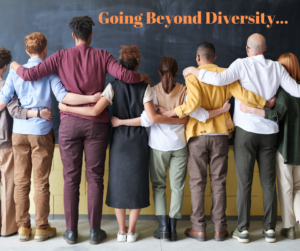28 Jun Going Beyond Diversity
Why Should We Create and Sustain a Truly Inclusive and Equitable Culture
Yesterday, I facilitated one of my favorite workshops, DEI, for a client in the DMV area. I love this theme (Diversity, Equity, and Inclusion) because I’m a devout student of culture. Every opportunity like this allows me to take my cultural intelligence to the next level.
I’m also passionate about supporting organizations that try their best to create a truly:
- Diverse,
- Equitable,
- Inclusive, and
- Accessible corporate culture.
Some years ago, I realized that in this globalized world of the 21st C, my CQ (Cultural Intelligence) could make or break my professional, leadership, and entrepreneurial success more than my IQ or even EQ (Emotional Intelligence).
People with high cultural intelligence have the mentality, confidence, and competencies to:
- Recognize,
- Honor, and
- Adapt to diverse cultures.
They can easily:
- Communicate,
- Connect,
- Get along,
- Work and partner with people from different cultural identities…
A devout student of Culture
By the way, I’m not saying ‘I’m a student of culture’ to be humble. Yes, I have real-world experience crossing many societal cultures:
- Subcultures within my native country, Ethiopia.
- Other African countries in the south and west, and
- The US.
I also crossed many corporate cultures:
- Science,
- Research,
- IT,
- Management and Leadership,
- Commercial Real Estate,
- Business Brokerage, and so on.
I’ve also been consulting companies and facilitating DEI workshops for years.
 Regardless, I don’t want to act like a culture expert. I don’t think anyone should claim to be an expert on culture. How many cultures and subcultures do we have in the world? Thousands! How many cultures can one master during one’s lifetime? Not that many.
Regardless, I don’t want to act like a culture expert. I don’t think anyone should claim to be an expert on culture. How many cultures and subcultures do we have in the world? Thousands! How many cultures can one master during one’s lifetime? Not that many.
Think about it. I’ve lived in the US for over 18 years, and I can’t claim to fully understand its culture and subcultures.
Why do I treat DEI facilitation sessions differently?
When I facilitate DEIA sessions, I:
- Create a safe environment from the get-go. For many people, it feels ‘unsafe’ to talk about sensitive issues, such as discrimination, biases, blind spots, stereotypes, etc., in a classroom. They also find it hard to engage in some difficult conversations publicly. That is why I firmly believe that my success as a learning professional depends on my initial ability to make people feel safe from the beginning. Though I create a safe environment whenever I facilitate any topic, I give special attention and take more time during DEI workshops. From the start, I ask participants: ‘How can we create a safe environment for everyone to open up, ask questions, and share their thoughts and stories without restraint?’ Then, together, we develop some ground rules that govern our conversations.
- Take the lead by sharing my cross-cultural journey right out of the gate. In every workshop, I introduce myself briefly. However, when I facilitate DEI sessions, I take a different approach. I share my cross-cultural journey.
- Become vulnerable. I tell them about the cultural shocks, anxiety, and frustrations I experienced as I crossed diverse cultures and subcultures. I also share the cultural missteps and mistakes I committed, some embarrassing.
- And more…
Diverse but not inclusive
Yes, many organizations managed to bring diverse people to the ‘table’. They came up with well-intended pro-diversity:
- Noble cause,
- Far-sighted vision,
- Ambitious goals,
- Policies, and
- Regulations.
Unfortunately, many of these well-meaning organizations are unable to go beyond diversity! They struggle to mix the people at the table well, so they’re not getting a fair return on their investment.
Not going beyond diversity is costly
Only a few organizations created and sustained a genuinely:
- Inclusive,
- Equitable, and
- Accessible culture.
The data shows that these few organizations outperform and outearn those who fail to do so by a significant margin, over 30%.
When a ‘diverse culture’ struggles to evolve and become inclusive, all its inhabitants don’t feel included and genuinely appreciated. As a result:
- They may not tap into their individual and collective potential.
- They may not go all in and give their best.
- They may not create and innovate.
- They may get stressed out, which may hurt their well-being.
- They may even call it quit and walk away.
- And more.
Putting in place rules and regulations will never be enough
If you ask those individuals leading DEI Initiatives, they will proudly tell you the extra mile they went to pursue their pro-diversity cause and their endless efforts to achieve their ambitious goals in achieving an inclusive culture. However, making MACRO structural changes and putting in place rules and regulations alone aren’t giving them the results they hope to gain.
There are some:
- Intangible,
- Subtle,
- Micro, and
- Subconscious-level attitude, words, behaviors, decisions, and actions that are sabotaging their initiative.
In our DEI workshops, we spend considerable time discussing:
- How these subtle barriers manifest themselves,
- What their impacts are,
- Tools, strategies, and tactics to use for tackling these potential ‘MICRO’ culprits that may prevent organizations from creating and sustaining an inclusive and equitable culture.
Self-auditing
From 1 to 10, 1 being non-inclusive, and 10 being truly inclusive:
- How do you grade the inclusiveness of your team’s or organization’s culture?
- If you scored less than 8, what do you think is coming in the way of preventing you from achieving an inclusive and equitable culture?
- What have you done so far to play your fair share toward creating a diverse, equitable, inclusive, and accessible culture? Is it working? Why?
- How can we help?
How can we help?
We would love to support your efforts. We can help you on two fronts:
- Consulting. We can help you create a truly inclusive, equitable, and accessible corporate culture that delivers results.
- Facilitation. We can help your leaders and team members develop the right mindset, get the latest insights, models, tools, and strategies, and, in turn, contribute their fair share in creating a genuinely inclusive culture.
Contact us via [email protected], and let’s schedule a one-on-one consultation session to learn more about your challenges and goals.
